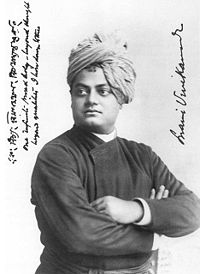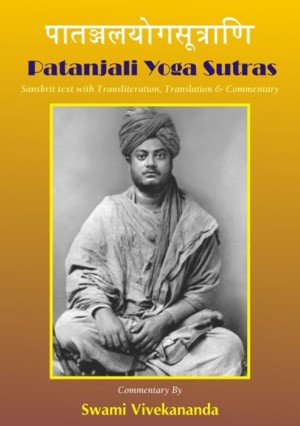CHAPTER II - SADHANA PADA
CONCENTRATION - ITS PRACTICE
॥ णितीम् साधनऩाद् ॥
Sādhana-Pāda
1. तपः स्वाध्यायेश्वरप्रणिधानानि क्रियायोगः ॥१॥
tapaḥ svādhyāy-eśvarapraṇidhānāni kriyā-yogaḥ ||1||
Those Samadhis with which we ended our last chapter are very difficult to attain; so we must take them up slowly. The first step, the preliminary step, is called Kriya Yoga. Literally this means work, working towards Yoga. The organs are the horses, the mind is the reins, the intellect is the charioteer, the soul is the rider, and this body is the chariot. The master of the household, the King, the Self of man, is sitting in this chariot. If the horses are very strong, and do not obey the reins, if the charioteer, the intellect, does not know how to control the horses, then this chariot will come to grief. But if the organs, the horses, are well controlled, and if the reins, the mind, are well held in the hands of the charioteer, the intellect, the chariot, reaches the goal. What is meant, therefore, by mortification? Holding the reins firmly while guiding this body and mind: not letting the body do anything it likes, but keeping them both in proper control. Study. What is meant by study in this case? Not study of novels, or fiction, or story books, but study of those books which teach the liberation of the soul. Then again this study does not mean controversial studies at all. The Yogi is supposed to have finished his period of controversy. He has had enough of all that, and has become satisfied. He only studies to intensify his convictions. Vada and Siddhanta. These are the two sorts of Scriptural knowledge, Vada (the argumentative) and Siddhanta (the decisive). When a man is entirely ignorant he takes up the first part of this, the argumentative fighting, and reasoning, pro and con.; and when he has finished that he takes up the Siddhanta, the decisive, arriving at a conclusion. Simply arriving at this conclusion will not do. It must be intensified. Books are infinite in number, and time is short; thereofre this is the secret of knowledge, to take that which is essential. Take that out, and then try to live up to it. There is an old simile in India that if you place a cup of milk before a Raja Hamsa (swan) with plenty of water in it, he will take all the milk and leave the water. In that way we should take what is of value in knowledge, and leave the dross. All these intellectual gymnastics are necessary at first. We must not go blindly into anything. The Yogi has passed the argumentative stage, and has come to a conclusion, which is like the rocks, immovable. The only thing he now seeks to do is to intensify that conclusion. Do not argue, he say; if one forces arguments upon you, be silent. Do not answer any argument, but go away free, because arguments only disturb the mind. The only thing is to train the intellect, so what is the use of disturbing it any more. The intellect is but a weak instrument, and can give only knowledge limited by the senses; the Yogi wants to go beyond the senses; therefore the intellect is of no use to him. He is certain of this, and therefore is silent, and does not argue. Every argument throws his mind out of balance, creates a disturbance in the Chitta, and this disturbance is a drawback. These argumentations and searchings of the reason are only on the way. There are much higher things behind them. The whole of life is not for schoolboy fights and debating societies. By “surrendering the fruits of work to God” is to take to ourselves neither credit nor blame, but to give both up to the Lord, and be at peace.
2. समाधिभावनार्थः क्लेश तनूकरणार्थश्च ॥२॥
samādhi-bhāvana-arthaḥ kleśa tanū-karaṇa-arthaś-ca ||2||
(They are for) the practice of Samadhi and minimising the pain-bearing obstructions.
Most of us make our minds like spoiled children, allowing them to do whatever they want. Therefore it is necessary that there should be constant practice of the previous mortifications, in order to gain control of the mind, and bring it into subjection. The obstructions to Yoga arise from lack of this control, and cause us pain. They can only be removed by denything the mind, and holding it in check, through these various means.
3. अविद्यास्मितारागद्वेषाभिनिवेशः क्लेशाः ॥३॥
avidyā-asmitā-rāga-dveṣa-abhiniveśaḥ kleśāḥ ||3||
The pain-bearing obstructions are - ignorance, egoism, attachment, aversion, and clinging to life.
These are the five pains, the fivefold tie that binds us down. Of course ignorance is the mother of all the rest. She is the only cause of all our misery. What else can make us miserable? The nature of the Soul is eternal bliss. What can make it sorrowful except ignorance, hallucination, delusion; all this pain of the soul is simply delusion.
4. अविद्या क्षेत्रमुत्तरेषाम् प्रसुप्ततनुविच्छिन्नोदाराणाम् ॥४॥
avidyā kṣetram-uttareṣām prasupta-tanu-vicchinn-odārāṇām ||4||
Ignorance is the productive field of all them that follow, whether they are dormant, attenuated, overpowered, or expanded.
Impressions are the cause of these, and these impressions exist in different degrees. There are the dormant. You often hear the expression “innocent as a baby,” yet in the baby may be the state of a demon or of a god which will come out by and by. In the Yogi these impressions, the Samskaras left by past actions, are attenuated; that is, in a very fine state, and he can control them, and not allow them to become manifest. Overpowered means that sometimes one set of impressions is held down for a while by those that are stronger, but they will come out when that repressing cause is removed. The last state is the expanded, when the Samskaras, having helpful surroundings, have attained to great activity, either as good or evil.
 Swami Vivekananda
Swami Vivekananda
